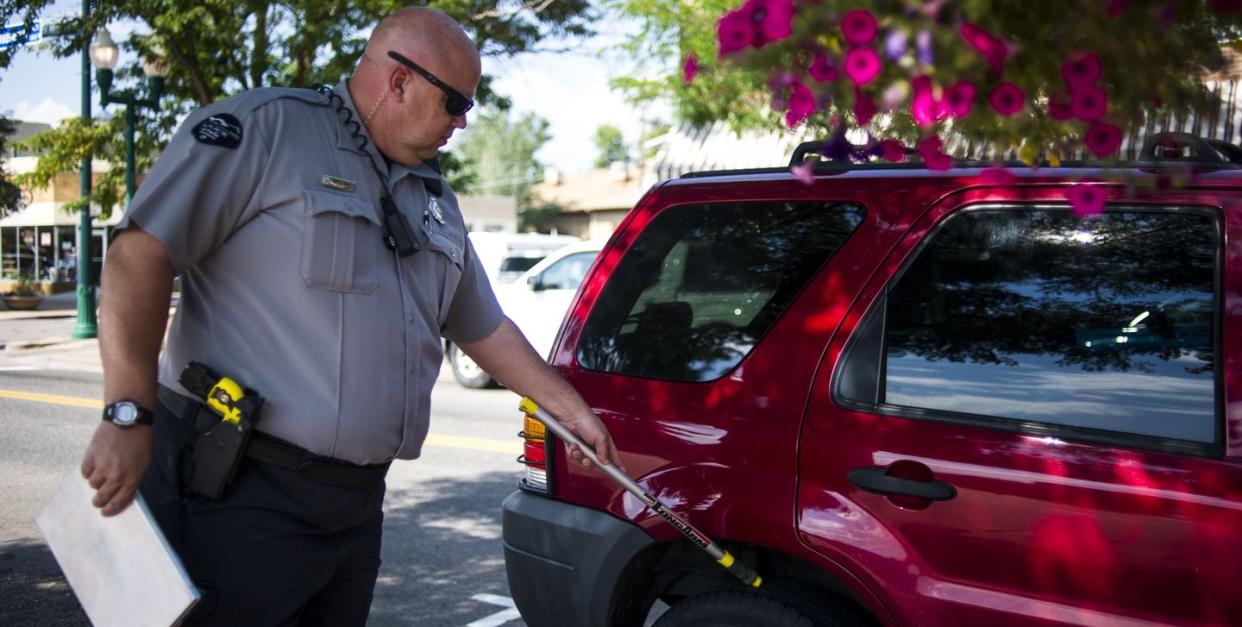Chalk It Up to the Constitution: Court Rules a Common Parking Enforcement Technique Is Unreasonable Search

For the second time in 2019, a Michigan woman has taken a seemingly minor cops-and-cars complaint to appeals court-and won (the other time involved hand gestures).
The U.S. Court of Appeals has ruled that police should no longer mark vehicles' tire treads with chalk to track how long a car is parked in a public space.
The precedent was a U.S. Supreme Court decision that attaching a GPS tracking device to a car counts as a search.
UPDATE 4/24/19: A clarification: The court's decision that chalking is unconstitutional does not mean the practice has to stop, or that it is outlawed (at least for now). Although this case was decided in a federal court, the plaintiff sued for "injunctive relief," meaning her victory takes the case back to her local court in Saginaw, Michigan, where it started. It does mean that it's likely that chalking will be reconsidered in the four states under the Sixth Circuit's jurisdiction: Michigan, Ohio, Kentucky, and Tennessee.
You've seen the practice before. Known as "chalking," it's when parking enforcement officers use chalk (or a paint pen or similar) to leave a little mark on a car's tire in order to help them track how long the vehicle stays in a given spot. Cars marked in this way that are still present beyond a given amount of time get parking tickets. Well, not so in the future, thanks to a Michigan woman and her court case fighting a parking ticket that snaked its way all the way to the U.S. Court of Appeals.
Litigant Alison Taylor is, depending on your point of view, either a hero or a serial parking-ticket recipient with a good lawyer and a serious grudge. She had been given 15 parking citations by the same chalk-happy officer before getting fed up and taking the city of Saginaw, Michigan, to court, arguing that marking people's tires amounts to an unconstitutional trespass, a sort of illegal search as judged against the Fourth Amendment's protections from unreasonable search and seizure. The city argued its search by chalk is reasonable and therefore required no warrant because it is part of a "community-caretaking function."
After the case was dismissed in favor of the city by the U.S. District Court for the Eastern District of Michigan, it was appealed to the U.S. Court of Appeals, Sixth Circuit, where it was reversed in a most puntastic way. As the court writes, "Because we chalk [the city's parking-enforcement practice] up to a regulatory exercise, rather than a community-caretaking function, we REVERSE."
What does this all mean?
A car, even one parked in a public place on a public street, counts as one's private property. Marking it-by, you know, literally touching it-was deemed a search by the Sixth Circuit's trio of judges, based on U.S. Supreme Court precedent that states that attaching a GPS tracking device to a car counts as a search. Both acts intend to track a vehicle's whereabouts through space and time, even if one's a lot lower-tech. According to the judgment, United States v. Jones, the Sixth Circuit writes, "When governmental invasions are accompanied by physical intrusions, a search occurs when the government: (1) trespasses upon a constitutionally protected area, (2) to obtain information."
Beyond establishing that chalk applications qualify as a search, the court's three judges sought to define that search as either reasonable or unreasonable. (The latter kind of search, of course, requires-with few exceptions-a warrant.) The panel unanimously agreed that the city failed to exhibit how marking a car parked in a public place for the purposes of revenue generation (not public safety or perceived danger, or the caretaking function mentioned earlier) qualified for exception from the warrant requirement, and therefore found that it constituted an "unreasonable" search.
And besides, chalking a vehicle when it's still in compliance with parking rules is like initiating a search on someone who has yet to commit a crime; in more legal terms, law enforcement has no probable cause to chalk a tire and lacks even an "individualized suspicion of wrongdoing" until a car is actually out of compliance with parking rules. Just because the possibility exists for a car to overstay its parking welcome doesn't mean it will.
So, chalking has been ruled unconstitutional-but that doesn't mean the end of parking fines as we know it. Instead, officers must write citations based on other, noninvasive, means of tracking cars' time spent in parking spaces. As for Alison Taylor, our tire sidewalls thank you for their future cleanliness. Also, try doing a better job of not getting parking tickets in the future.
('You Might Also Like',)

